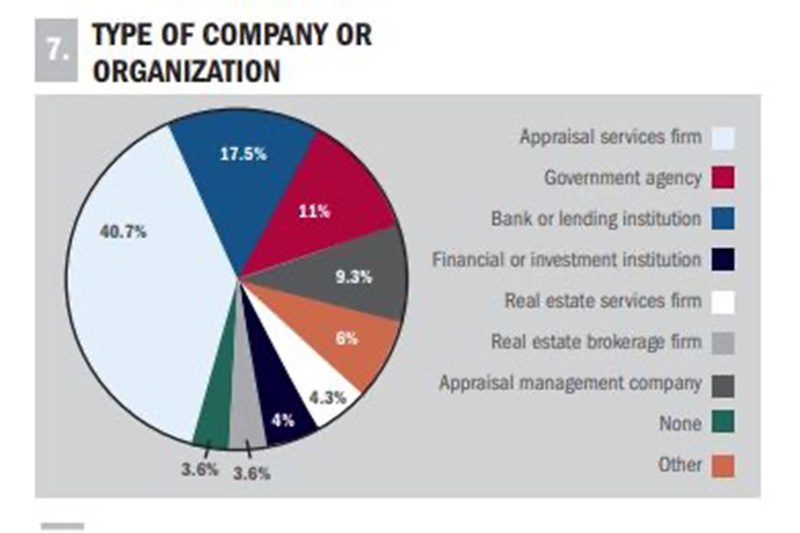
Finding people to fill jobs seems to be a common problem across industries these days, and the commercial appraisal field is no exception. According to the Appraisal Institute (AI), research shows the number of appraisal professionals has been shrinking at a rate of 2.6% per year for the past several years. The association anticipates sharper declines on the horizon due to a convergence of issues – an aging industry and fewer new entrants coming in to replace those that are retiring out. In fact, the AI estimates that more than 70% of the nearly 78,000 commercial and residential appraisers in the profession are 50+ or older.
Yet that “graying” of the profession also creates tremendous opportunity for newcomers in terms of jobs, and importantly, a path for career advancement to executive, senior leadership and even ownership positions.
Down but not out
The valuation profession has been working to stem the tide of declining numbers by attracting new talent. One of the primary hurdles in the commercial valuation field is simply a career choice that many people don’t know about coming out of college. The profession often gets overshadowed by other highly visible careers in commercial real estate, such as brokerage, development, investment sales and prop-tech. Changing that mindset involves educating people, not only about the good, steady jobs available in the appraisal profession, but also the opportunities for career development and different career paths offered by the training and education a valuation career offers.
Another solution is to address some of the common misperceptions of valuation work. Oftentimes, people view commercial appraisal as an accounting-like job where you sit in a cubicle, crunching numbers all day. However, the best valuation professionals don’t “ride the desk” every day. In fact, valuation is a great option for those who like to get outside of the office. Most good appraisers are spending at least one to two days of the week outside of the office looking at real estate. It is important for appraisers to have “boots on the ground” and look at the property, neighborhood and trade area fundamentals first-hand to see how physical and social factors impact valuation.

Another common misperception is real estate appraisers are a group of anti-social introverts. In my experience, the best appraisers are ones who are able to build and maintain strong relationships with clients, property owners, brokers, and property managers to gather information and generate a strong network of repeat business and referrals. Some of the pros and cons of the professional to consider include:
The Pros:
Valuation is a really good entry point into the commercial real estate industry because it provides the education necessary to understand how to create real estate value.
Valuation may not be as lucrative as some other commercial real estate careers. However, it does provide a good stable income, and offers the best opportunity to scale their earnings. According to the Appraisal Institute, nearly half of appraisers (45%) earn $100,000 or more and 21% earn more than $150,000. Most experienced appraisers are paid based on their productivity (in other words, not a flat salary.
You are not stuck behind a desk all day. Appraisers have plenty of opportunities to be outside of the office regularly.
There is opportunity for specialization in a certain geographic market or property type, i.e. hotels, senior housing or industrial. Specialization also allows appraisers to further develop their expertise nationally, allowing for the opportunity to travel and live/work from anywhere.
The Cons:
The deadlines for valuation assignments can sometimes be stressful and working on multiple assignments at once oftentimes requires long hours at times.
In addition, most valuation jobs are not structured with a fixed salary model, although this has been changing recently within some firms. Production-based compensation can provide great upside earning potential once trained.
Is Valuation right for you?
So, what are the education and skills that the top valuation firms are looking for? According to AI, more than half of appraisers (59%) hold a four-year bachelor’s degree. Traditionally, firms have targeted finance professionals however, IRR is expanding its search to include history or English majors who have stronger communication and writing skills, since valuation involves writing reports that support valuation opinions.
So how do you know if valuation is right for you? Well, there are ideal personality types that work well for appraisal. IRR has created a personality scoring system that highlights four specific quadrants: reporter / investigator / teacher / social scientist. Appraisers are basically reporting to the market to support their opinion of value. So, you need a strong reporting and writing skillset. Having a genuine curiosity and investigative drive while conducting research on a property and market also is important. The scientist often is someone who wants to know the answer for answer’s sake, as well as someone who wants to know what’s happening in the market. Good appraisers can fall into one of these four areas.
Other qualifications that are a good fit for appraisal include:
• Some previous real estate knowledge or background is helpful.
• Strong organizational skills are a must.
• Being more logic based versus emotion based is beneficial.
• Possessing the ability to work independently.
So, if an appraisal career sounds interesting and you think you might be a good fit, I encourage you to learn more. Do some online research, call a local appraisal office or two, invite someone to lunch. It may just be the start of a rewarding, long-term career in the commercial real estate industry.
Anthony Graziano, MAI, CRE, is chief executive officer at Integra Realty Resources, Boston, Mass.








